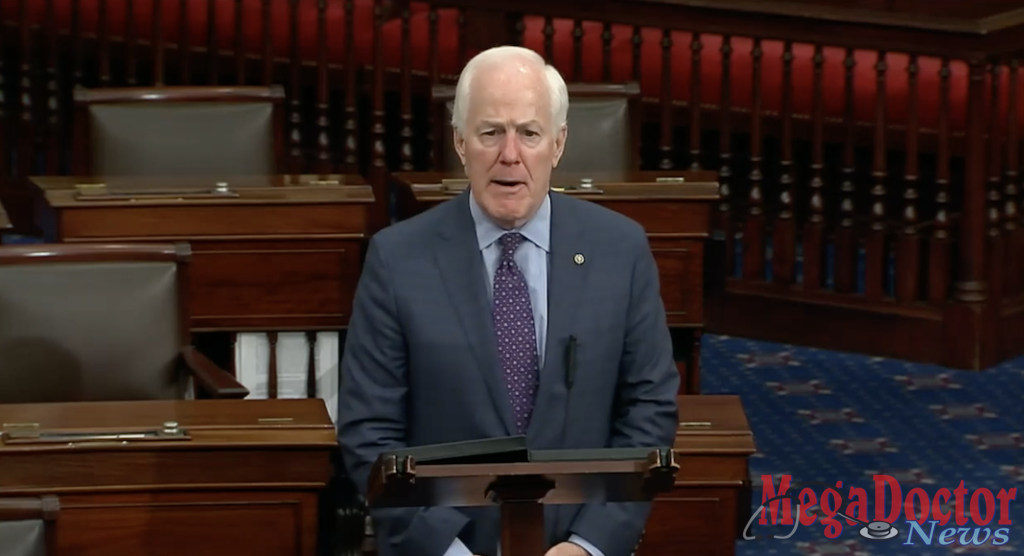Mega Doctor News
WASHINGTON – U.S. Senator John Cornyn (R-TX) supported Senate passage of the CARES Act, critical legislation to get relief to Texans dealing with the COVID-19 pandemic. Excerpts of his speech on the Senate floor yesterday are below, and video can be found here. A summary of how the bill will benefit Texans follows the excerpts.
“Already we were able to work and send two bills to the President’s desk for signature. The first sent vital support to health care professionals and first responders who are doing everything they can to treat patients and prepare for more cases. We also provided initial funding for the development of a vaccine, clinical trials, and more diagnostic tests. The second bill we passed focused more on the small businesses and the individual workers who are impacted economically.”
“Sadly, over the last few days, our colleagues on the other side of the aisle have been oblivious to the sense of urgency that every other American seems to understand. After the original, intense bipartisan negotiations, we were finalizing a third relief bill which included, by definition, ideas from both Republicans and Democrats.”
“Our Democratic colleagues blocked us from even debating the bill, not once but twice. The Minority Leader said the bill, which his members had helped write, wasn’t good enough. He spent the next three days trying to change the bill to include provisions that he thought were more important priorities during a national emergency. Things like tax credits for solar panels and tighter emissions standards for airlines, proposals that have absolutely nothing to do with this crisis.”

“This bill sends desperately needed funding to hospitals that are struggling to manage an influx of patients and helps fight the shortage of masks and other personal protective equipment.”
“A family of four will receive up to $3,400 under this legislation, which will go a long way to throwing that lifeline to them and cover their rent, groceries, electric bills, and other expenses until they can make other arrangements, like apply for unemployment insurance under our beefed-up provisions.”
“This legislation will also provide relief for small businesses that are struggling to stay afloat.”
“With both the physical and economic health of our country in crisis, this bold legislation is our best path forward.”
“The American people are depending on us to respond responsibly in a bipartisan way during an emergency like this, and we cannot let them down.”
How the CARES Act helps Texans:
- Aids the health care industry responding to the pandemic:
- Provides an additional $100 billion for hospitals
- Provides $11 billion for vaccines, therapeutics, diagnostics, and other medical needs
- Provides $1.5 billion in support for local, state, and federal public health agencies
- Opens up telehealth access for home-based services, community health centers, and rural health centers and provides an additional $1.3 billion for community health centers to treat COVID-19 patients
- Provides direct and immediate financial relief to Texans:
- Allots $1,200 checks to each Texan making less than $75,000 annually ($2,400 for a couple making less than $150,000 annually), plus $500 per child
- Allows Texans to access their retirement plans for coronavirus-related expenses without an early withdrawal penalty
- Allows Texans to defer student loan payments for 6 months with no penalty or interest
- Incentivizes charitable giving by temporarily increasing the amount Texans can deduct from their taxes for charitable contributions, and allows
- Expands unemployment insurance (UI) for Texas workers:
- Provides an extra $600 weekly federal UI benefit on top of the state maximum temporarily
- Funds an additional 13 weeks of federally-funded unemployment eligibility for individuals after they’ve exhausted state UI benefits through the end of the year
- Temporarily expands UI eligibility to include the self-employed, independent contractors, those with limited work history, railroad workers, and those who worked at non-profit entities
- Injects targeted funding to state and local entities:
- $150 billion for state and local governments, allotted based on population (any city or county with more than 500,000 residents can petition the U.S. treasury directly for funding)
- $272 billion in targeted funding for state and local assistance, including:
- State, local, and tribal governments
- Hospitals and health care workers
- Law enforcement and first responders
- Scientists researching treatments and vaccines
- Small businesses struggling to pay their employees
- Local schools and universities
- Affordable housing and homelessness assistance programs
- The purchase of personal protective equipment (PPE) and medical equipment
- Offers relief for Texas businesses:
- Provides $500 billion in secured loans to affected businesses and establishes an Inspector General and Oversight Board to provide accountability for the loan program
- Provides $350 billion for SBA interruption loans
- Provides bankruptcy relief for Texas small businesses by raising the maximum debt threshold for eligibility, so that more small- and medium-sized businesses can get through bankruptcy faster and more easily
- Delays the employer payroll tax
- Increases the amount of deductible business interest allowed
- Offers a Temporary Employer Retention Credit for certain businesses
- Temporarily freezes the Employer Student Loan Repayment
- Allows SBA loan forgiveness for mortgage payments, payroll, and utility payments
- Suspends aviation excise taxes through 2020; provides $32 billion in payroll assistance grants for airlines like those based in Texas and supporting industries
Senator John Cornyn, a Republican from Texas, is a member of the Senate Finance, Intelligence, and Judiciary Committees.




















